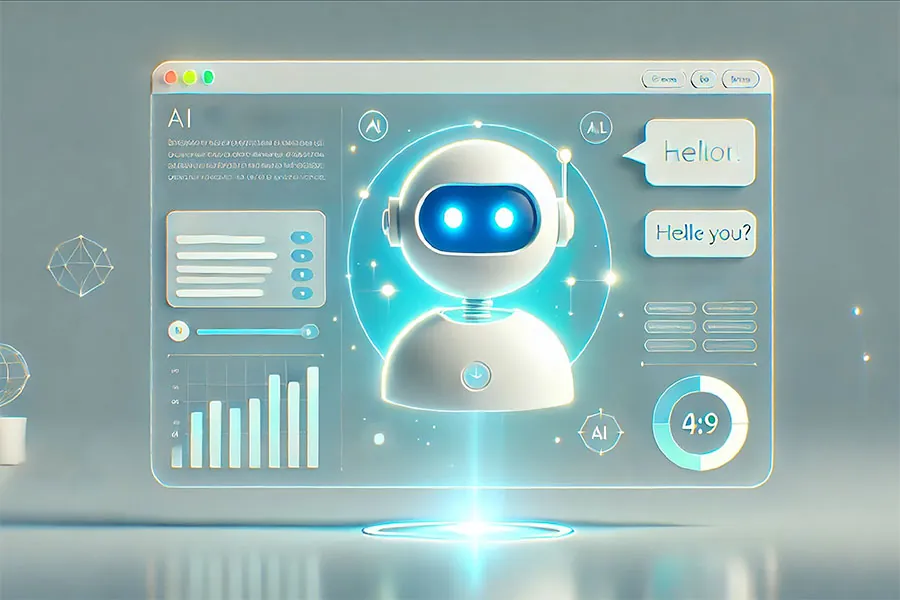AI Website Chatbot Best Practices for Taiwanese Manufacturers


AI chatbots are a powerful tool for Taiwanese manufacturers who want to include AI marketing into their plans for 2025:
Table of Contents
- Improve customer engagement: Provide 24/7 support and personalized experiences.
- Generate leads: Capture contact information and qualify potential customers.
- Increase sales: Guide customers towards inquiries and product information.
- Enhance your brand image: Project a professional and innovative image.
Why Do You Need an AI Website Chatbot?
Imagine having a friendly and knowledgeable salesperson available 24/7 to answer your customers’ questions and guide them towards an inquiry. That’s what an AI chatbot can do for your business. AI website chatbots are like virtual assistants that can chat with your website visitors, answer their questions, and even help them place orders. For more general information about AI marketing please read our guide to AI Marketing for manufacturers.
But simply adding a website chatbot to your website isn’t enough. To truly maximize its potential, you need a strategic approach that includes the right website content and regular blog posts to provide fresh training content for the chatbot. This article will guide you through the best practices for implementing and managing AI chatbots, ensuring they become a valuable asset for your business.
What Do You Want Your Website Chatbot to Do?
Before you create a chatbot, it’s important to think about what you want it to achieve. Do you want it to:
- Generate leads? Capture contact information from potential customers and qualify them for your sales team.3
- Provide customer support? Answer common questions, resolve issues, and offer assistance with orders.4
- Recommended products? Suggest relevant products based on customer needs and preferences.
Consider your customers and what they might need help with. Who are you trying to reach with your chatbot? Are they existing customers, potential clients, or people from specific industries?
For example, if you sell industrial equipment, your chatbot could help engineers find technical specifications and documentation. If you sell electronics, your chatbot could guide customers through the setup process or troubleshoot common problems.
Giving Your Chatbot a Personality
Just like a good salesperson, your chatbot should have a friendly and helpful personality. It should also reflect your brand’s values and tone of voice. Think about how you want your chatbot to sound. Should it be:
- Formal or casual?
- Friendly or professional?
- Humorous or serious?
In Taiwan, it’s important to be polite and respectful. Your chatbot should reflect these cultural values. Consider using honorifics and avoiding overly casual language.
Planning Your Chatbot’s Conversations
Your chatbot’s conversations should be natural and easy to follow. Think about the different questions your customers might ask and how your chatbot should respond. For example, if a customer asks about pricing, your chatbot should be able to provide that information clearly and concisely. If a customer asks for product recommendations, your chatbot could provide recommendations for their needs and suggest the most suitable options.
What if My Chatbot Can’t Answer a Question?
It’s okay if your chatbot can’t answer every question. You can set it up to transfer complex inquiries to a human agent or create an email inquiry from the chat directly. This ensures that your customers always receive the assistance they need, even if it requires a more personalized touch.
You can also create a list of frequently asked questions (FAQs) that your chatbot can access. This can help it answer common queries quickly and efficiently. FAQs are helpful for customers and so they are also good for your website’s SEO optimization too.
Over time, your chatbot will learn from its interactions and become better at answering questions. You can continuously train it with new information and improve its ability to handle complex inquiries.
A Surprising Statistic about Website Chatbots
“62% of website visitors would rather interact with a chatbot rather than wait for a real person to respond.”
How Do I Know if My Chatbot is Doing a Good Job?
It’s important to track how your chatbot is performing. This will help you see what’s working and what needs improvement. You can track things like:
- Engagement rate: How many people are interacting with your chatbot?
- Conversion rate: How many leads is your chatbot generating? How many sales are being made through the chatbot?
- Customer satisfaction: Are customers happy with their interactions with the chatbot?
- Response time: How quickly is your chatbot responding to inquiries?
If your chatbot is helping you generate more leads, resolve customer issues more efficiently, or improve customer satisfaction, you know it’s doing a good job.
Key Takeaways About AI Chatbots
AI chatbots are a powerful tool for Taiwanese manufacturers:
- Improve customer engagement: Provide 24/7 support and personalized experiences.
- Generate leads: Capture contact information and qualify potential customers.
- Increase sales: Guide customers towards inquiries and product information.
- Enhance your brand image: Project a professional and innovative image.
Don’t be afraid to experiment and try new things with your chatbot. The more you use it, the better it will become. If you need help getting started with AI chatbots, GlobalSense can provide expert guidance and support.
